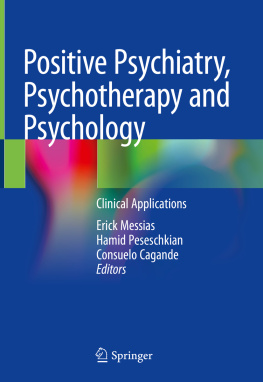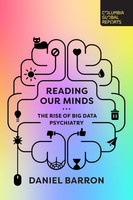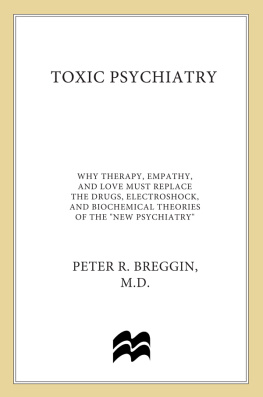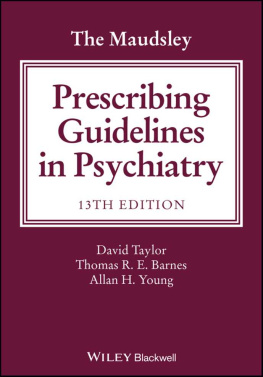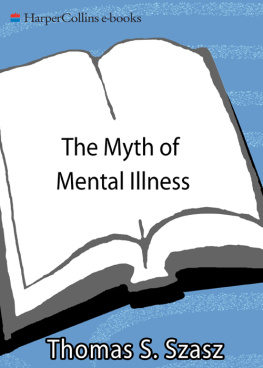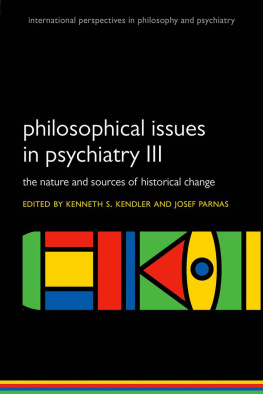
UNHINGED
THE TROUBLE WITH PSYCHIATRYA DOCTORS REVELATIONS ABOUT A PROFESSION IN CRISIS
DANIEL CARLAT


FREE PRESS
A Division of Simon & Schuster, inc.
1230 Avenue of the Americas
New York, NY 10020
www.SimonandSchuster.com
Copyright 2010 by Daniel Carlat
All rights reserved, including the right to reproduce this book or portions thereof in any form whatsoever. For information address Free Press Subsidiary Rights Department, 1230 Avenue of the Americas, New York, NY 10020
The names and details of the patients and other individuals in this book have been changed, and some patients are composites.
First Free Press hardcover edition May 2010
FREE PRESS and colophon are trademarks of Simon & Schuster, inc.
For information about special discounts for bulk purchases, please contact Simon & Schuster Special Sales at 1-866-506-1949 or business@simonandschuster.com.
The Simon & Schuster Speakers Bureau can bring authors to your live event. For more information or to book an event contact the Simon & Schuster Speakers Bureau at 1-866-248-3049 or visit our website at www.simonspeakers.com.
Manufactured in the United States of America
1 3 5 7 9 10 8 6 4 2
Library of Congress Cataloging-in-Publication Data Carlat, Daniel J.
Unhingedthe trouble with psychiatry: a doctors revelations about a profession in crisis / Daniel Carlat.1st Free Press hardcover ed.
p. cm.
Includes bibliographical references and index.
1. PsychiatryEvaluation. 2. Psychotropic drugs. 3. Psychotherapists.
I. Title.
[DNLM: 1. Mental Disorderstherapy. 2. Psychiatrytrends. 3. Psychotherapymethods. WM 400 C278u 2010]
RC437.5.C3197 2010
616.89dc22 2009046185
ISBN 978-1-4165-9079-8
ISBN 978-1-4165-9635-6 (ebook)
For my mother, AnitaMay you dance to the end of time.
CONTENTS
UNHINGED
Chapter 1
The Trouble with Psychiatry
For the last fifteen years, Ive practiced psychiatry in a small town north of Boston. It is a solo private practice. I see mostly middle-class patients who come to me with depression, anxiety, substance abuse, and occasionally more severe problems, such as bipolar disorder or schizophrenia.
Like most other psychiatrists of my generation, I have specialized in prescribing medications and have referred patients in need of talk treatment to a psychotherapist. During my training at Massachusetts General Hospital, I was taught that we are on the threshold of understanding the biochemistry of mental illness. After I graduated from residency, I worked hard to keep up with the explosion of neuroscience knowledge, and I absorbed the intricacies of how to use the new psychopharmaceuticals as they poured forth from the drug companies at a dizzying clip. By harnessing these powerful medications, I thought I was providing my patients the best psychiatric treatment possible.
But a couple of years ago, I saw a patient who made me question both my profession and my career.
Carol, in her midthirties, had short brown hair and strikingly green eyes that were filled with despair. Once we were seated in my office, I asked her, How can I be of help?
My father was killed in a car accident, she said, choking back tears.
How awfulwhen did this happen?
Last month.
Carol told me that she had been in the car with her father, who was driving. They came over a rise in the road, and another car was just pulling out of a driveway in front of them. Her father tried to swerve, but it was too late. They collided with the other car, and her father, who was not wearing a seat belt, was killed instantly. Miraculously, Carol was not seriously injured.
Since then, she said, she had recurrent dreams about the accident, and couldnt prevent herself from replaying the scene during the day. The events would unreel themselves like a movie in front of her, and often she would start sobbing uncontrollably. I recognized these experiencesnightmares and flashbacksas typical symptoms of post-traumatic stress disorder, or PTSD. I asked her a series of questions about other symptoms, such as poor concentration, insomnia, being easily startled, and the need to avoid situations reminding her of the crash, all of which are commonly associated with PTSD.
She said she was experiencing all of them. Her life was constricting inward. She drove rarely, avoiding especially the road where the accident had occurred.
Are you avoiding anything else? I asked.
I wont watch TV. I cant read the newspaper. I never realized how many stories there are about car accidents in the news.
I asked her about symptoms of depression. She reported insomnia and poor motivation, but no suicidal ideation.
The worst thing, she said, is how guilty I feel.
Why guilty? I asked.
It was my fault that we crashed. I got him upset.
Her eyes began to well up. I was telling him that he shouldnt be drinking.
He was drinking and driving?
She nodded. I told him I could smell it on his breath and that he shouldnt be driving. He got mad, started yelling at me. And then he floored the gas pedal, said something like Am I driving good enough now? Thats when it happened.
I could see that this was more than a simple case of PTSD. She would have complicated feelings about her father to wrestle withgrief, regret, and eventually a good deal of anger.
As the end of the hour approached, I told her a bit about PTSD, about the prognosis for recovery, and about the usual treatments.
So what do you think I should do? she asked me.
Id like to give you some medication to help you through this, I said. I wrote out prescriptions for the antidepressant Zoloft and for the tranquilizer Klonopin. Then I reached into my file cabinet, and handed her a business card. And this is a good therapist who I often work with. I recommend that you give her a call and set up an appointment. The medication works better when you are also seeing a counselor.
She looked confused. Arent you my therapist?
I shook my head. Unfortunately, I dont have time in my practice to do therapy. I usually refer patients to psychotherapists whom I trust.
So... am I going to see you again?
Yes, well schedule another appointment in about a month, to see how the medications are working. But in the meantime, I hope youll have had a couple of sessions with this other doctor.
Carol still didnt look at all happy with this.
But arent there any psychiatrists that do therapy?
There are a few, I said, but not many. Theyre hard to find these days.
After Carol left my office, I finished writing her intake note. I closed her chart, put my pen down, and looked out my office window at the white-steepled Unitarian church across the street. There was nothing unusual about my encounter with Carol. I did what most psychiatrists do when they encounter a new patient. I sat comfortably in my red leather chair, wearing my suit and tie, and I asked her a series of diagnostic questions. Her answers fit neatly into a recipe book of psychiatric diagnoses called the DSM-IV (Diagnostic and Statistical Manual of Mental Disorders, fourth edition), and I pieced together a diagnosis that made sense to me. I then reached over to my desk, wrote out a prescription, and handed it to her.
Pondering this typical appointment, what struck me most was what I did
Next page

